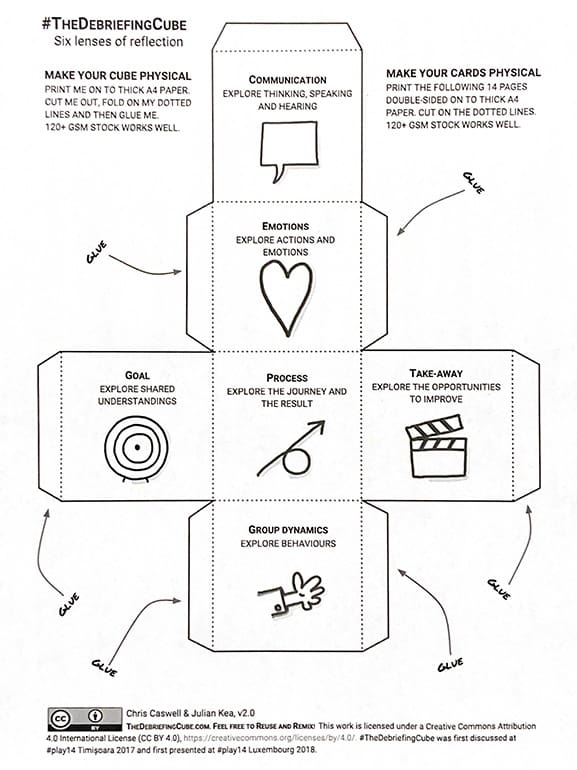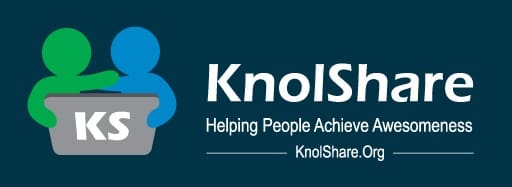Debriefing Activities to Increase Knowledge Retention in your Audience
Debriefing Cube

The Debriefing Cube has six sides that include 1) Goal, 2) Process, 3) Group Dynamics, 4) Communications, 5) Emotions, and 6) Take-aways. Recently, I spoke at the Agile Arizona North and South Meetups, as well as used the tool in a Advanced Scrum class to build a repository of questions that can be shared with learning communities during a debrief session or retrospective event. Please find the contributions of over 50 people sharing questions that can extend the debriefing cube initial set of questions.
Goal (Explore shared understandings):
- How familiar are you with fundamentals of Scrum?
- Was the goal to understand the basics of Scrum?
- Why did you play the game?
- What did you expect and what did you learn?
- Why did we play in groups?
- Did the instructions help you understand the goal?
- Was the goal and outcome the same thing?
- How did you self-organize?
- Did we understand what the goal was?
- Was there a shared understanding?
- What was this easy or hard?
- What was the source to form our agreement?
- What do you think the purpose of the game was?
- What did you think would happen?
- Did you feel like everyone was able to participate or was heard?
- Did we have a shared understanding?
- How do you know everyone understands before we start?
- What does success look like (Acceptance Criteria)?
- What was discussed, learned, or the objective?
- Was there a reward / price?
- Did we begin by seeking to solve first?
- Was the goal / outcome the same thing?
- Was the timeframe flexible and did we factor it into the goal?
- Was the goal easy or hard?
- Was there an expectation to learn?
- Do we know when we are done (Definition of Done)?
- Do we know when we are ready (Definition of Ready)?
- What was the value of the goal?
- Was the goal attainable?
- Did you have control of everything needed to achieve the goal?
- What the communication of the goal consistent?
Process (Explore the journey and the result):
- What roles and responsibilities emerged?
- What step was hard?
- What step was easy?
- How could we make that more efficient?
- What could we do differently?
- Well? Not well? Better?
- What did you end up feeling was the best way to sort?
- What part of the process was hard?
- How would effectiveness be different if roles were switched?
- Do you feel everyone contributed?
- How would it be different with more people?
- If we had used Scrum.org would it have been faster?
- If we had divided role and responsibilities at the beginning, would it have been better?
- Was there any fun?
- What approach did you take?
- Did anyone step forward as a leader?
- How did you participate?
- Did you distribute the work?
- Did you feel the process was worthwhile or achieved the goal?
- Did you collaborate?
- Was the process fun?
- Who made decisions?
- What roles emerged in the process?
- What decisions did you make?
- Was the process effective?
- What was the process – should we have adjusted?
- How were decisions made?
- Were there a-ha moments? How did we adjust after this?
- How did we feel about our journey?
- Could we do anything better?
- What did we do well?
- Did anyone step forward to lead?
- Can we repeat the process?
- Did you find the process efficient?
Group Dynamics (Explore behaviors):
- Was seating decided for us?
- What two words described how we worked together?
- Who was the leader?
- Did it help to stand?
- How did attitudes affect the activity?
- Did frequency matter in the team?
- Did everyone in the team contribute?
- Was there room for improvement so that everyone can contribute?
- How did you handle the disagreements?
- Did people participate in all the of the phases?
- Did everyone participate?
- Did everyone ask questions?
- How did you organize yourself?
- Is there a game or set of questions you can create to learn more?
- Guess which Scrum pillar, flip and discuss.
- Could there have been better intros or Retros?
- Did you create Working agreements?
- Were the roles chosen effective?
- Could you have made changes?
- How did you handle disagreements?
Communications (Explore thinking, speaking, and hearing):
- New or known – different style
- Tuchman at play (form, storm, norm, perform, and adjourn)?
- Talk vs do?
- Did we pat each other on the back?
- Was everyone comfortable?
- Did we create a safe environment?
- Interrupt? Loud? Talk over each other?
- In what ways did we communicate without speaking?
- Could we have played that game in silence? How would that have been different (Fish in the pond game)?
- Was every voice heard?
- Did anyone dominate?
- How did / can you draw other into the conversation?
- Could we have used the fish in the pond game for anonymous feedback?
- What was left unspoken, could we discuss now?
- Did we speak over each other or interrupted politely or impolitely?
- Did we overpower, frustrate each other?
- Did you felt not heard or not part of the activity?
- What was the mood?
- Did you have a productive discussion?
- What challenges did you experience and how were they resolved?
- Were there limitations to communications, language, or impairments?
- Did you establish parking lot rules?
- Did you need a communication agreement?
- Why did we have anything unspoken?
- Was there balance in participation?
- Did we pat each other on the back?
- Did we create a safe space?
- What were the non-verbal communication signals?
Emotions (Explore actions and emotions):
- Do you feel any emotions about the outcome?
- Positive vs negative chart?
- Anxiety?
- How many emotions did you experience (Feeling about the process)?
- Did fear manifest? How?
- Did you care about the game or the group?
- Did you care about learning or the outcome?
- Did you feel comfortable, valued, heard, and / or engaged?
- Did you feel heard?
- Did you feel comfortable?
- What frustrated you?
- Were you enjoying the game or more concerned about the outcome?
- Was it fun?
- Were you frustrated or emotional?
- What was the mood?
- Were you time panicked or stuffed?
- Did you experience distractions, engagement, or warnings?
- Were you most concerned about outcome or people?
- Did you feel comfortable?
- How did it make you feel?
Take-Aways (Explore the opportunities to improve):
- How will you apply this experience tomorrow?
- Why are some of Spencer’s co-workers so competitive?
- How does it make you a better person?
- What resonated the most with you?
- What will you use in tour next assignment?
- What could be better next time?
- What surprised you?
- Did you learn anything new?
- What did you learn that was new?
- What did it remind you of?
- Did you meet anyone new?
- Would you recommend this game?
- What if we rotated the rules?
- What actions items did you capture?
- What can I apply or research?
- What did I learn about myself?
- What was most valuable to me, the team, the company?
- What am I committing to?
- Can I use what I learned as a retrospective tool?
Get the Core Scrum 101 Card Game
The KnolShare Agile Scrum Learning Cards Volume 1 provide a simple way to learn about the Scrum framework, which include the following:
- Scrum Definition
- Uses of Scrum
- Scrum Theory
- Scrum Values
- Scrum Team
- Scrum Events
- Scrum Artifacts
- Artifact Transparency
Copyright 2020 KnolShare.
